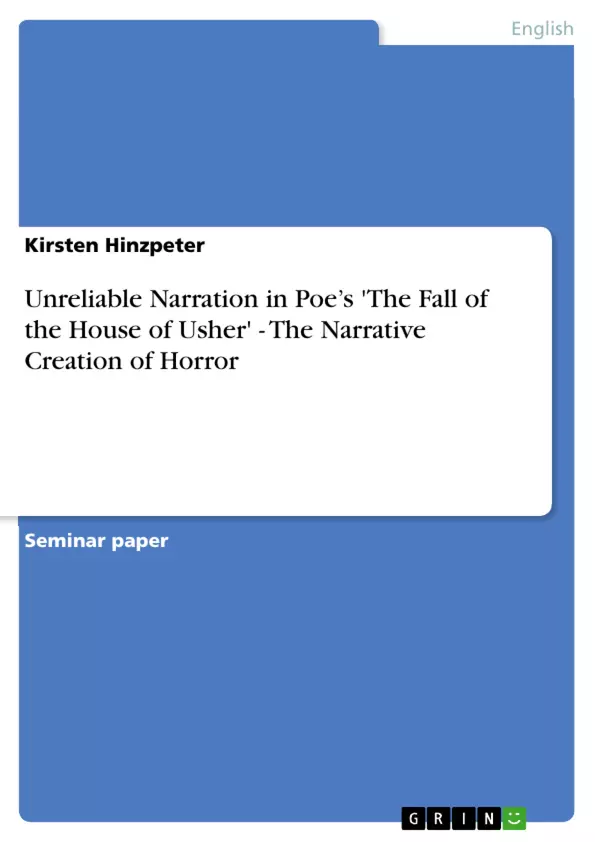Edgar Allen Poe is certainly one of the most famous writers of Gothic fiction of the nineteenth century. His tales are known for dark settings and characters with diseased or deluded minds . Moreover, in Poe’s fiction it is often the case that “the boundaries between reality, illusion and madness remain unresolved” . These are undoubtedly factors that contribute to the terror created in his works. However, are those to be considered the prime reasons for the terror in Poe’s fiction? There are other factors which are not as easily detected but which might still be the chief reasons and can be related to the above mentioned ones, such as the unreliability of the narrator. In order to further examine this thesis “The Fall of the House of Usher” , one of his most widely known short stories, will be looked at in the following with regard to the question whether the terror is caused by the unreliability of the narrator or whether there are other reasons mainly responsible for it. However, prior to dealing with this question a definition of unreliable narration will be given and the narrator of “The Fall of the House of Usher” will be examined concerning his reliability.
Inhaltsverzeichnis (Table of Contents)
- Introduction
- What is unreliable narration?
- The unreliability of the narrator in "The Fall of the House of Usher"
- Is the terror caused by the unreliability of the narrator?
Zielsetzung und Themenschwerpunkte (Objectives and Key Themes)
This paper examines the role of unreliable narration in creating terror in Edgar Allan Poe's "The Fall of the House of Usher." The main objective is to analyze whether the terror stems primarily from the narrator's unreliability or from other factors such as setting and characters.
- Unreliable narration as a literary device
- The psychological state of the narrator in "The Fall of the House of Usher"
- The relationship between the narrator's unreliability and the overall atmosphere of terror
- The impact of gothic settings and characters on the reader's experience of terror
- Analysis of textual inconsistencies and their interpretation
Zusammenfassung der Kapitel (Chapter Summaries)
Introduction: This section introduces Edgar Allan Poe and his Gothic fiction, highlighting the ambiguous boundaries between reality, illusion, and madness in his works. It poses the central question of whether the terror in Poe's fiction is primarily caused by unreliable narration.
What is unreliable narration?: This chapter explores the complexities of defining unreliable narration, focusing on Ansgar Nünning's cognitive approach. It emphasizes the role of the reader's world-model and the interaction between textual inconsistencies and the reader's frames of reference in determining a narrator's reliability.
The unreliability of the narrator in “The Fall of the House of Usher”: This section analyzes the narrator's reliability in Poe's short story. It investigates the narrator's potential depression and susceptibility to the gothic atmosphere, examining textual evidence to support the argument of the narrator's unreliability. The discussion includes the narrator's descriptions of his mental state, potential drug use (opium), and instances of cognitive restriction.
Schlüsselwörter (Keywords)
Unreliable narration, Edgar Allan Poe, The Fall of the House of Usher, Gothic fiction, terror, cognitive linguistics, frame theory, textual inconsistencies, psychological state, narrator's reliability, opium, gothic atmosphere.
Frequently Asked Questions
What is the main research question of this paper?
The paper investigates whether the terror in Poe's "The Fall of the House of Usher" is primarily caused by the unreliability of the narrator.
How is "unreliable narration" defined in this context?
The paper uses Ansgar Nünning's cognitive approach, where unreliability is determined by the interaction between textual inconsistencies and the reader's world-model.
What evidence suggests the narrator in Poe's story is unreliable?
Evidence includes the narrator's admitted mental state (potential depression), possible drug use (opium), and his susceptibility to the oppressive gothic atmosphere of the house.
What role does the setting play in creating terror?
The gothic setting acts as a catalyst for the narrator's psychological decline, blurring the lines between reality, illusion, and madness.
Why is the boundary between reality and madness unresolved in Poe's fiction?
Poe often uses diseased or deluded minds to tell the story, making it difficult for the reader to distinguish objective facts from the narrator's distorted perceptions.
- Quote paper
- Kirsten Hinzpeter (Author), 2009, Unreliable Narration in Poe’s 'The Fall of the House of Usher' - The Narrative Creation of Horror, Munich, GRIN Verlag, https://www.grin.com/document/187482



